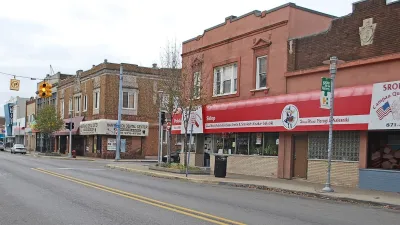A Burlington program is using grocery trolleys to remind residents that, for many of them, a grocery store is less than a mile away.

Pointing to the fact that 90 percent of Burlington residents live within 1,500 steps from a grocery store, Net Zero Vermont is encouraging people to walk, rather than drive, when making short grocery trips, according to a Burlington Free Press article by Kate O’Farrell.
To promote this concept, a program called Walk to Shop sells rolling trolleys designed to bring groceries home more efficiently. “Walk To Shop is working to show that many people live close to grocery stores and want to raise awareness and make walking to shop a possibility through their grocery trollies.”
O’Farrell describes the program, which started in 2021 with funding from the Vermont Agency of Transportation's 2020 Mobility and Transportation Innovation Grant. “The program sells two versions of trollies, a medium-sized trolley for $40 with a 40 pound capacity, and a larger size for $50 that can handle 50 pounds,” solving a key issue for shoppers. “The trollies encourage people to walk because even if you live close to a grocery store, lugging heavy bags is a roadblock that stops people from walking.”
Considering that “The U.S. Environmental Protection Agency reports that 10 billion miles are driven each year in the United States for trips under a mile,” Reducing the number of short trips taken by car can have a significant collective impact on greenhouse gas emissions, pollution, and congestion.
FULL STORY: How a trip to the grocery store can be a tool for sustainability

Maui's Vacation Rental Debate Turns Ugly
Verbal attacks, misinformation campaigns and fistfights plague a high-stakes debate to convert thousands of vacation rentals into long-term housing.

Planetizen Federal Action Tracker
A weekly monitor of how Trump’s orders and actions are impacting planners and planning in America.

In Urban Planning, AI Prompting Could be the New Design Thinking
Creativity has long been key to great urban design. What if we see AI as our new creative partner?

King County Supportive Housing Program Offers Hope for Unhoused Residents
The county is taking a ‘Housing First’ approach that prioritizes getting people into housing, then offering wraparound supportive services.

Researchers Use AI to Get Clearer Picture of US Housing
Analysts are using artificial intelligence to supercharge their research by allowing them to comb through data faster. Though these AI tools can be error prone, they save time and housing researchers are optimistic about the future.

Making Shared Micromobility More Inclusive
Cities and shared mobility system operators can do more to include people with disabilities in planning and operations, per a new report.
Urban Design for Planners 1: Software Tools
This six-course series explores essential urban design concepts using open source software and equips planners with the tools they need to participate fully in the urban design process.
Planning for Universal Design
Learn the tools for implementing Universal Design in planning regulations.
planning NEXT
Appalachian Highlands Housing Partners
Mpact (founded as Rail~Volution)
City of Camden Redevelopment Agency
City of Astoria
City of Portland
City of Laramie





























